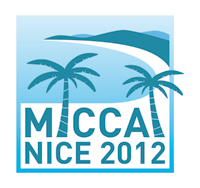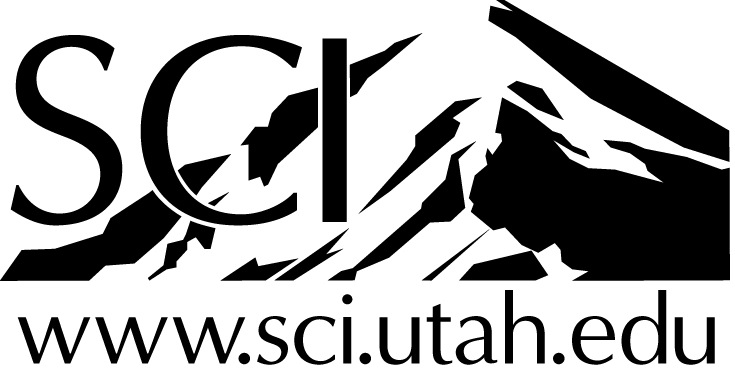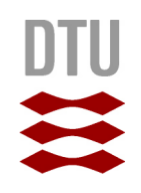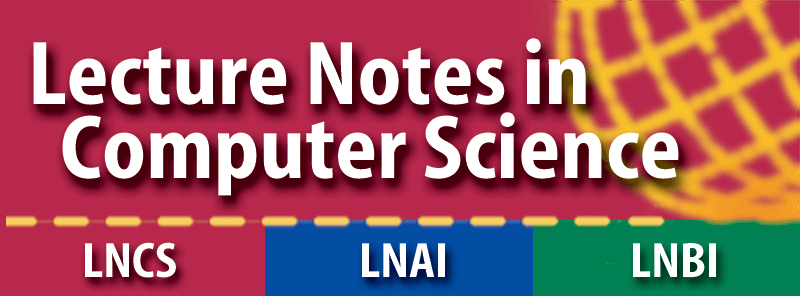Invited Speakers
Leif Kobbelt - Mesh and Surface Processing
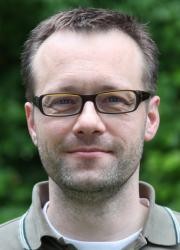 Leif Kobbelt completed his PhD at the University of Karlsruhe in 1994. After a postdoc stay at the University of Wisconsin he joined the Computer Graphics Group at the University of Erlangen in 1996 and completed his Habilitation in 1999. Shortly after being appointed an associate professor at MPI Informatik in Saarbrücken, he received an offer for a full professorship from RWTH Aachen University and moved to Aachen in 2001 where he is now the head of the Computer Graphics and Multimedia Group. His research interests include most areas of Computer Graphics and Computer Vision with a focus on Geometry Processing, Multiresolution and Freeform Modeling, 3D Model Optimization, and the efficient handling of polygonal meshes. He is actively involved in diverse research collaborations in application fields ranging from CAD/CAM and medical image processing to mobile multimedia applications, simulation sciences, and psychology. He cooperates with research groups and companies in Europe, North America and Asia. Leif's research work during the last years resulted in numerous widely cited publications in top scientific journals and international conferences. For his scientific contributions he received several renowned awards, including the Heinz-Maier-Leibnitz Award 2000 from the German Federal Government and the Outstanding Technical Contribution Award 2004 from the Eurographics Association. In 2008 he was named a Eurographics fellow. He frequently serves on program committees of major international conferences and organized and chaired several workshops and conferences.
Talk abstract
Leif Kobbelt completed his PhD at the University of Karlsruhe in 1994. After a postdoc stay at the University of Wisconsin he joined the Computer Graphics Group at the University of Erlangen in 1996 and completed his Habilitation in 1999. Shortly after being appointed an associate professor at MPI Informatik in Saarbrücken, he received an offer for a full professorship from RWTH Aachen University and moved to Aachen in 2001 where he is now the head of the Computer Graphics and Multimedia Group. His research interests include most areas of Computer Graphics and Computer Vision with a focus on Geometry Processing, Multiresolution and Freeform Modeling, 3D Model Optimization, and the efficient handling of polygonal meshes. He is actively involved in diverse research collaborations in application fields ranging from CAD/CAM and medical image processing to mobile multimedia applications, simulation sciences, and psychology. He cooperates with research groups and companies in Europe, North America and Asia. Leif's research work during the last years resulted in numerous widely cited publications in top scientific journals and international conferences. For his scientific contributions he received several renowned awards, including the Heinz-Maier-Leibnitz Award 2000 from the German Federal Government and the Outstanding Technical Contribution Award 2004 from the Eurographics Association. In 2008 he was named a Eurographics fellow. He frequently serves on program committees of major international conferences and organized and chaired several workshops and conferences.
Talk abstract
Andrew McCulloch - Biomechanical and Electrophysiological Modeling
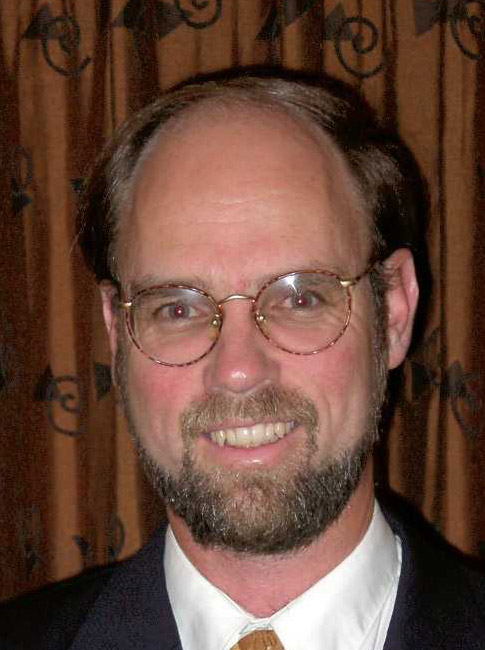 Dr. Andrew McCulloch is Professor of Bioengineering and Medicine and Jacobs School Distinguished Scholar at the University of California San Diego, where he joined the faculty in 1987. Dr. McCulloch is a Principal Investigator of the National Biomedical Computation Resource and Co-Director of the Cardiac Biomedical Science and Engineering Center. He served as Chair of Bioengineering from 2005 to 2008 is currently Director of the HHMI-NIBIB Interfaces Graduate Training Program and the UCSD Interdisciplinary Ph.D. Specialization in Multi-Scale Biology.
Dr. Andrew McCulloch is Professor of Bioengineering and Medicine and Jacobs School Distinguished Scholar at the University of California San Diego, where he joined the faculty in 1987. Dr. McCulloch is a Principal Investigator of the National Biomedical Computation Resource and Co-Director of the Cardiac Biomedical Science and Engineering Center. He served as Chair of Bioengineering from 2005 to 2008 is currently Director of the HHMI-NIBIB Interfaces Graduate Training Program and the UCSD Interdisciplinary Ph.D. Specialization in Multi-Scale Biology.Dr. McCulloch was educated at the University of Auckland, New Zealand in Engineering Science and Physiology receiving his Ph.D. in 1986. Dr. McCulloch was an NSF Presidential Young Investigator and is a Fellow of the American Institute for Medical and Biological Engineering. He has served on the Board of Directors of the Bio-Medical Engineering Society, and is currently chair of the Physiome and Systems Biology Committee of the International Union of Physiological Sciences.
Dr. McCulloch's lab uses experimental and computational models to investigate the relationships between the cellular and extracellular structure of cardiac muscle and the electrical and mechanical function of the whole heart during ventricular remodeling, heart failure and arrhythmia. Dr. McCullochs talk will be about creating meshes from patients for biomechanical and electrophysiological modeling applications. Talk abstract
Pierre Alliez - Geometry Processing
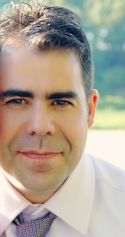 Pierre Alliez completed his PhD at Telecom ParisTech in 2000. After a postdoc stay at the University of Southern California with Prof. Mathieu Desbrun, he joined Inria Sophia-Antipolis - Mediterranee in 2002, where he is Senior Researcher since 2010. He has authored many scientific publications and several book chapters on topics commonly referred to as geometry processing: mesh compression, surface reconstruction, mesh generation, surface remeshing and mesh parameterization. He co-authored a book entitled Polygon Mesh Processing. He is an associate editor and developer of the Computational Geometry Algorithms Library and an associate editor of the ACM Transactions on Graphics since 2010. He was awarded in 2005 the EUROGRAPHICS young researcher award for his contributions to computer graphics and geometry processing. He was co-chair of the Symposium on Geometry Processing in 2008 and of Pacific Graphics in 2010. He was awarded in 2011 a Starting Grant from the European Research Council on Robust Digital Geometry Processing.
Talk abstract
Pierre Alliez completed his PhD at Telecom ParisTech in 2000. After a postdoc stay at the University of Southern California with Prof. Mathieu Desbrun, he joined Inria Sophia-Antipolis - Mediterranee in 2002, where he is Senior Researcher since 2010. He has authored many scientific publications and several book chapters on topics commonly referred to as geometry processing: mesh compression, surface reconstruction, mesh generation, surface remeshing and mesh parameterization. He co-authored a book entitled Polygon Mesh Processing. He is an associate editor and developer of the Computational Geometry Algorithms Library and an associate editor of the ACM Transactions on Graphics since 2010. He was awarded in 2005 the EUROGRAPHICS young researcher award for his contributions to computer graphics and geometry processing. He was co-chair of the Symposium on Geometry Processing in 2008 and of Pacific Graphics in 2010. He was awarded in 2011 a Starting Grant from the European Research Council on Robust Digital Geometry Processing.
Talk abstract
Best paper prize
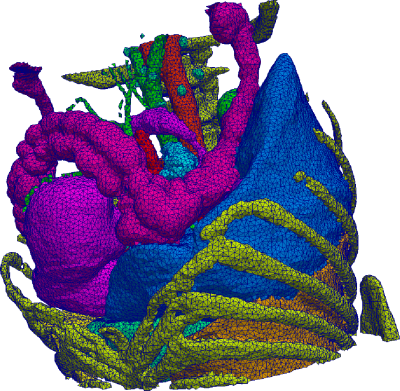 The best paper prize was awarded to Thomas Albrecht for the paper Automatic Fracture Reduction..
The best paper prize was awarded to Thomas Albrecht for the paper Automatic Fracture Reduction..
Program
Each paper has 15 minutes for presentation and 5 minutes for Q and A. Novotel Hotel, first floor, Rooom CheretNice, France
| Time | Activity |
|---|---|
| 7.30- | Registration |
| 9.00 | Welcome |
| 9.05 | Invited Plenary Talk: Leif Kobbelt - Mesh and Surface Processing |
| 9.50 | Robust and Scalable Interactive Freeform Modeling of High Definition Medical Images. Noura Faraj, Jean-Marc Thiery, Isabelle Bloch, Nadège Varsier, Joe Wiart and Tamy Boubekeur |
| 10.10 | Automated Segmentation of Cerebral Aneurysms Based on Conditional Random Field and Gentle Adaboost. Hong Zhang, Yuanfeng Jiao, Jessica Zhang and Kenji Shimada. (note: program update) |
| 10.30 | Coffee Break |
| 11.00 | Invited Plenary Talk: Andrew McCulloch - Biomechanical and Electrophysiological Modeling |
| 11.50 | Automatic Fracture Reduction. Thomas Albrecht and Thomas Vetter. |
| 12.10 | Age-Related Changes in Vertebral Morphometry by Statistical Shape Analysis. Tristan Whitmarsh, Luis Del Rio Barquero, Silvana Di Gregorio, Jorge Malouf Sierra, Ludovic Humbert and Alejandro Frangi. |
| 12.30 | Lunch and Poster Session |
| 14.00 | Invited Plenary Talk: Pierre Alliez - Geometry Processing |
| 14.50 | Automatic Meshing of Femur Cortical Surfaces from Clinical CT Images. Ju Zhang, Duane Malcolm, Jacqui Hislop-Jambrich, C David L Thomas and Poul Nielsen. |
| 15.10 | Statistical Surface Recovery: A Study on Ears. Rasmus R. Jensen, Oline Olesen, Rasmus R. Paulsen, Mike Van Der Poel and Rasmus Larsen. |
| 15.30 | Coffee Break |
| 16.00 | 3D Anatomical Shape Atlas Construction using Mesh Quality Preserved Deformable Models. Xinyi Cui, Shaoting Zhang, Yiqiang Zhan, Mingchen Gao, Junzhou Huang and Dimitris Metaxas.(note: program update) |
| 16.20 | Carving Mesh with Deformation for Soft Tissue Removal Simulation. Youngjun Kim, Seungbin Lee, Frederick Roy, Deukhee Lee, Laehyun Kim and Sehyung Park. |
| 16.40-17.10 | Best paper prize, Discussion, and Workshop closing |
Posters
- Synthesis of Realistic Subcortical Anatomy with Known Surface Deformations. Yi Gao and Sylvain Bouix.
- Robust Shape Correspondence via Spherical Patch Matching for Atlases of Partial Skull Models. Boris Gutman, Ryan McComb, Won Moon and Paul Thompson.
- Feature-Preserving, Multi-Material Mesh Generation using Hierarchical Oracles. Max Kahnt, Heiko Ramm, Hans Lamecker and Stefan Zachow.
- Partition Cortical Surfaces into Supervertices: Method and Application. Gang Li, Jingxin Nie and Dinggang Shen.
- Automatic Boundary Evolution Tracking via a Combined Level Set Method and Mesh Warping Technique: Application to Hydrocephalus. Jeonghyung Park, Suzanne Shontz and Corina Drapaca.
- Simplified Reeb Graph as Effective Shape Descriptor for the Striatum. Antonietta Pepe, Laura Brandolini, Marco Piastra, Juha Koikkalainen, Jarmo Hietala and Jussi Tohka.
- Topology aware Quad Dominant Meshing for Vascular Structures. Dominik Sibbing, Hans-Christian Ebke, Kai Ingo Esser, and Leif Kobbelt.
- Surface and Volume Mesh Generation with CGAL. Jane Tournois, Laurent Rineau, (GeometryFactory), Mariette Yvinec, Pierre Alliez (INRIA).
- Volumetric Real-Time Particle-Based Representation of Large Unstructured Tetrahedral Polygon Meshes. Philip Voglreiter, Markus Steinberger, Dieter Schmalstieg and Bernhard Kainz.
